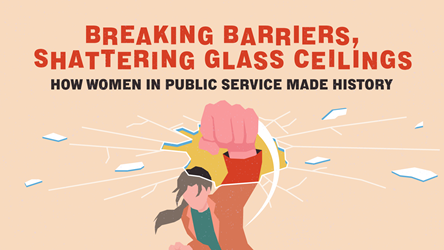Project Dignity Kitchen, Giving Work to Disabled and Disadvantaged
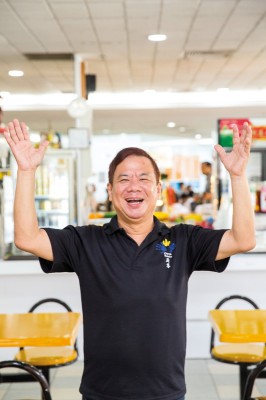
But look closer, and there is the drinks stall in the middle that stands out, its posters showing a variety of sign language gestures. There’s also Mr Peter Ong who helms the stall. Though he is hearing-impaired, he can read lips so he will understand what you are saying to him. But if you wiggle your hands by your head (“Hello!”), he will teach you how to order your choice of kopi in sign language.
Founded by social entrepreneur Koh Seng Choon, Dignity Kitchen provides hawker training and employment to the disabled and disadvantaged. Its mission is to change society’s perceptions of these less fortunate people, and restore dignity to them through vocation.
“My purpose is not to give you the fish, but to teach you how to fish. More importantly, I want to give you back your self-respect,” explains Mr Koh, who is the executive director of Dignity Kitchen.
Most of the trainees have a range of disabilities – physical, mental, and intellectual – while the rest are those who have fallen through the cracks, including disadvantaged single mothers and ex-prisoners. So far, Dignity Kitchen has trained more than 160 students and placed them in jobs at hawker centres, cafes and hotels.

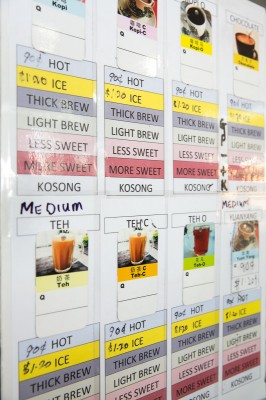
Humble start
The social enterprise started in 2010 at Balestier Market Food Court with three stalls. Initially, Mr Koh’s staff wore badges stating their disabilities – deaf, blind, “simple” (intellectually challenged) – but this attempt to gain customers’ understanding backfired. They made only $97 in the first month.
Sales improved after the staff stopped wearing their badges. This taught Mr Koh an important lesson: the greatest challenge is to change customers’ perception that the disabled cannot deliver quality food and service. He also realised that Singaporeans will only return for food that tastes good.
When Dignity Kitchen moved to Kaki Bukit a year later, Mr Koh called on his contacts in the food and beverage industry to help. As a result, Dignity Kitchen’s food has been “fine-tuned” with expertise from chicken rice specialist Thian Boon Hua from Boon Tong Kee, celebrity chef Eric Teo who specialises in Western cuisine, and Chen Fu Ji Restaurant owner Roger Koh who helped to refine the noodle dishes.
A hawker training school for all
Two years on, Dignity Kitchen has evolved to become a full-fledged hawker training school for both the able-bodied and disabled, offering Workforce Skills Qualifications under the Singapore Workforce Development Agency (WDA). Trainees learn about basic food hygiene, food display and setting up a hawker business, as well as how to cook popular local dishes.
Compared with able-bodied learners, teaching disabled trainees could take 10 times longer, says Mr Loy Teck Wee, a chef-turned-hawker who is a trainer at the school. Trainers have to be patient and simplify learning for the disabled, using visual aids such as drawings and videos.
They are also always seeking solutions to help their disabled staff and students. For instance, Singapore’s dollar bills have Braille patterns, but the feature is harder to feel on plastic notes. Mr Koh thus devised a method of folding bills into triangles to help the blind trainees identify the denominations (up to $50) based on the width of the diagonal.
Dignity Kitchen also has customised equipment that caters to the special needs of disabled staff. Worktops have adjustable heights for the wheelchair-bound and cash registers are marked in Braille. Modified machines and utensils allow food to be prepared one-handed. But like the example of folding dollar notes, the solutions that work best often cost nothing, says Mr Koh.
He cites the case of a young trainee with cerebral palsy who could not grip utensils, a huge obstacle for an aspiring hawker. Nonetheless, the youth persisted in attending the training course. This spurred the trainers to find a solution and they did – bending metal spoons until they created one that could hook onto his arm. With that, the young man completed his training and eventually found a job.
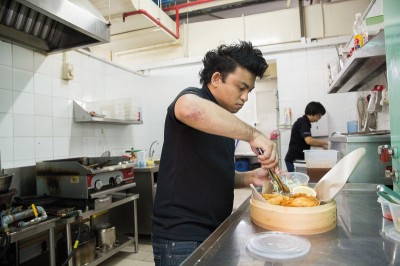
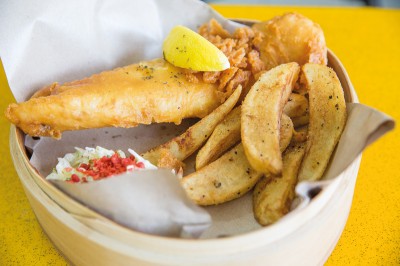


Looking from another’s point of view
Starting and running a social enterprise comes with many challenges. Mr Koh’s early plans and funding proposals were rejected by the government agencies he had approached.
To get seed money, he started with SPRING Singapore. They liked his idea but because of its “social angle”, they referred him to the then-Ministry of Community Development, Youth and Sports. Officers there praised his idea too, but pointed him to WDA for funding of education and training. However, WDA does not fund start-ups and so they directed him – back to SPRING Singapore.
“One big round!” Mr Koh exclaims as he recounts the story. Following the success of Dignity Kitchen, the officers who had initially rejected his proposals subsequently told him they should have viewed it from his perspective.
Mr Koh does not blame them. “They look at things from the Government’s perspective, which means key performance indicators (KPIs). But if [they] want to have enterprises, [they need to] try to see it from the entrepreneur’s point of view – why is he doing this, and how? Once they understand that, they will support you.”
Still, Mr Koh believes social enterprises must be sustainable and he expects to break even in the second half of 2013. But the future of Dignity Kitchen remains uncertain as they once again have to move out of their premises – this time by early 2014 because of an expiring lease. Despite the difficulties of rising rentals and finding an appropriate location, Mr Koh is optimistic and dreams of having an initial public offering for Dignity Kitchen: “I want to tap commercial money for a social cause.”
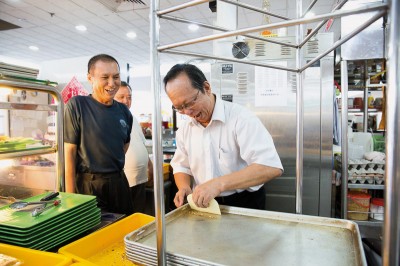
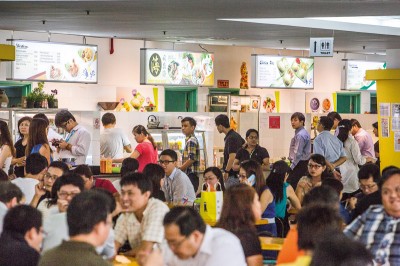
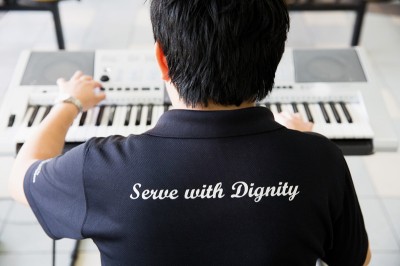
Advice from Mr Koh Seng Choon on meeting others’ needs
- Check your mindset: you must believe that there is a solution for every problem.
- Never think that any solution is final: “Sometimes you have to change it to suit different people and needs.”
- Start with the beneficiary in mind: “Don’t think about the costs, but what is good for the beneficiary.”
- Identify what the beneficiary really needs: “[But] to be fair, sometimes they also don’t know until they see it.”
- Be creative or ask for help: “There are many smart people in Singapore; you just need to ask and they will help.”
- Persevere: “Go beyond your scope of work to see how you can help out.”
- POSTED ON
Sep 19, 2013
- TEXT BY
Siti Maziah Masramli
- PHOTOS BY
Norman Ng





